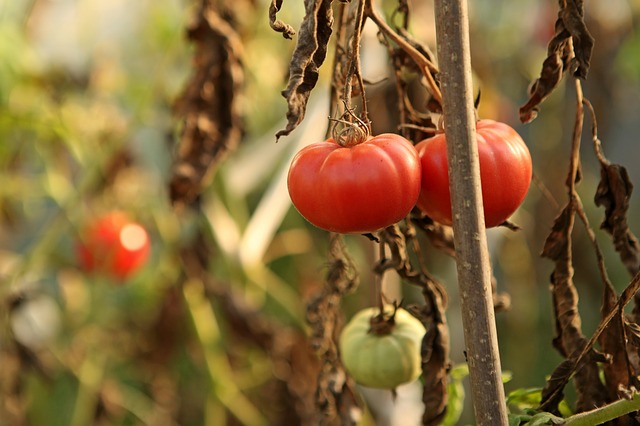HEIRLOOMS
I love all my open-pollinated heirloom varieties of vegetables and flowers. They are perfectly designed for growing in an organic garden. Heirlooms have not been tampered with by man and each seed being it’s original and perhaps changed only by nature itself. They are historical seeds that have been saved and passed down through many generations of farmers and gardeners. Pictured above are my Purple Calabash heirloom tomatoes on the vine. This particular heirloom tomato was brought to the southern states of the U.S. with the slaves that were carried here on ships mainly from Africa. They planted them in their own small gardens on the plantation and sometimes the master of the plantation would buy them for their own table. The best place to begin when choosing seeds or plants is to try to pick varieties that will be suited for your area. Although the exciting thing with heirlooms is that they actually acclimate to your region as well as your soil. Every year you save seed from them the healthier and stronger they become and more suited to your garden.
We experienced very strong southern winds from the gulf the early part of summer. They blew hard against my crops and the Roman Stripped tomato plants for several days. I noticed the branches on this heirloom tomato began to wrap themselves tightly to the ropes I tie them to. It was an amazing thing to witness as they appeared to exhibit the intellect of a human child with little hands holding on to a swing as they swayed in the wind. I had to laugh to myself, thinking hold on guys, it has got to be over soon. If people can talk to their animals, I really don’t know what is wrong with me thinking to my tomatoes. For as much wind as we have had, we’ve had serious drought too. I’m thinking the seed saved from my heirlooms this season should also cause them to become more drought tolerant as well. With all that being said, it becomes very economical as well when you can save seeds every year without the expense of purchasing new ones.
HYBRIDS
The thing to understand about hybrid varieties is that they are created by man from nature. Hybrids are sliced and diced and cross-pollinated by hand in the effort of bringing other desirable traits together. One tomato may be cross-pollinated with another variety in a laboratory to create a new type of tomato. In many instances, especially with fruits and vegetables, I think they have gone overboard and bred the nutritional value and flavor right out of them while trying to create the picture perfect hybrid. Personally, I think heirlooms are pure art in nature. I also don’t believe that hybrids are a good choice for organic gardens. Most hybrids were actually bred to be grown with chemical fertilizers and herbicides in mind. Once varieties have been crossed you won’t always have success in replanting saved seed. The hybrid seeds do not always grow back as the hybrid it was intended to be. I’ve seen some very strange things grow from a hybrid seed right out of my compost pile from something we had bought from the supermarket.
I think many gardeners and even farmers are not as successful trying to grow organic crops using hybrid varieties. To grow organically with success means to grow in the natural conditions that nature provides and most hybrids cannot withstand the elements naturally. And frankly, hybrids offer very little back to nature. It’s true as in native plants that the natives provide more nutrition and food for the pollinators and beneficial insects than the hybrid varieties. While it may be true that hybrids will out produce many heirloom varieties they will still lack the quality of the heirloom. The heirloom’s flavor is to be unmatched.
One must know that cross-pollination can happen in nature all by itself, especially with food crops like cucumbers and corn. Natural pollinators like bees can cross-pollinate your cucumbers if you have more than one variety growing in your garden at the same time. The wind pollinates the corn and can cross-pollinate your corn from miles away. If you were to save the seed from such things than it would no longer be true to its variety. It’s best to grow only one type at a time if your planning on saving seed or cover with netting or even plant at different times so that they are not in flower at the same time. Tomatoes and peppers are a couple of vegetables that do not cross-pollinate from nature so you can plant as many different varieties as you like.
GMO
The GMO or genetically modified organism is an altogether different seed or crop than the heirloom or the hybrid. GMO’s can be any plant, animal or microorganism and have been genetically altered using molecular genetic techniques such as gene cloning and protein engineering. While the genes or proteins may be from a natural substance it is really not natural for them to be in the seed. A good example is that of corn because it is the most widely grown GMO crop in the U.S. They have introduced a BT which is a bacteria into the seed to help control the corn earworms. Although BT is a natural bacteria, again it is not natural for that bacteria to be in the corn seed. So unlike the hybrid plant that has been cross-pollinated with another plant, GMO is putting things into the seed that are foreign to it. Another example with all GMO crops is that they were designed to withstand chemical weed killers. Roundup is the most used chemical. Now the farmers can spray their crops with chemicals and it is supposed to kill the weeds but not the crop. Problems have already been happening with the new growth of superweeds that the weed killer can’t kill. There have been recent news reports stating that the Monarch Butterflies are in dangerous decline again throughout the Midwest because of the weed killers killing off all the Milkweed needed for the Monarchs to lay their eggs. Another example is that which is happening to our honeybees in a serious peril called CCD, Colony Collapse Disorder and linked to the overuse of chemicals.
The companies that have engineered this GMO seed have also received paton’s for their mad science creations. This makes it very difficult and prohibits further research by outside sources, so very little is actually known about the GMO seed besides what information we receive from the corporations own researchers. This makes me and a whole lot of people very uncomfortable. There are many possible long term side effects that no one has answers for. I don’t know many people who want to rely on the information given to us from a corporation that stands to make millions of dollars on their products. I recommend reading about the two most noteworthy scientists and biochemists that have done research on GMO outside of the corporations. One is a scientist in Scotland, Dr. Arpad Pusztai, who discovered the effects of GMO potatoes on lab rodents. Because of his findings, Europe does not sell GMO food in its supermarkets. The other being Dr. Don Huber of Purdue University who was also a biochemist colonel in the military. In his research, he has found a dangerous unknown pathogen created from the use of round up and round up crops.
There are weights and measures we must all consider when making choices and important decisions when it comes to our gardens and how our food is grown. It is certainly clear to me that heirlooms are our best choice. Is it okay to grow hybrids? I certainly don’t think a hybrid here or there puts anything at great risk as long as the hybrid does not interfere with the heirloom and the hybrid is not the main focus. The benefits of growing in a diverse and organic method far outweigh conventional methods. It is true that food grown in rich organic soil will far outlast the conventional methods when it comes to drought. As we are experiencing the 3rd worse drought in Texas history and costing over 3 Billion dollors for losses in crops, I think it should leave us with a huge question on our minds “is it worth all of those chemicals and unnatural GMO crops and the risks they impose?
- Wild Dagga Motherwort Medicinal Herb - November 11, 2013
- Grow The Best Organic Lettuce - November 4, 2013
- Amish Hot Pepper Mustard - October 23, 2013


One thought on “Heirlooms, Hybrids And GMO”